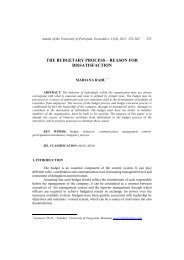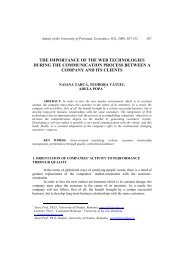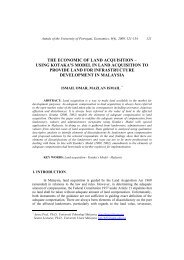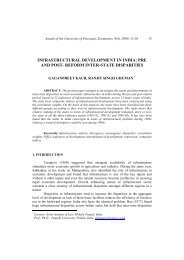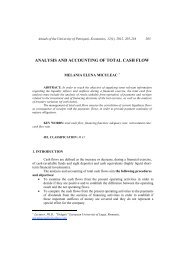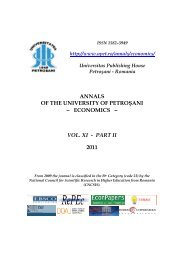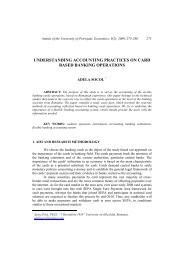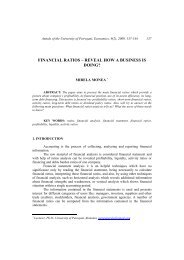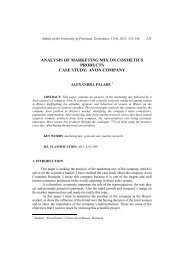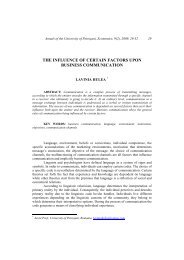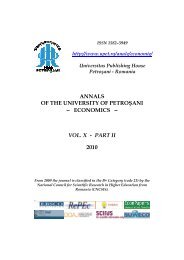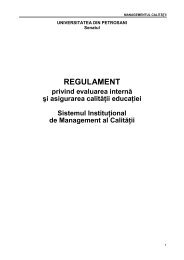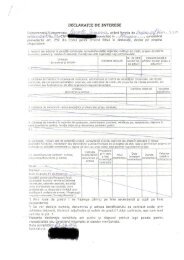annals of the university of petroÅani â¼ economics â¼ vol. xi - part i ...
annals of the university of petroÅani â¼ economics â¼ vol. xi - part i ...
annals of the university of petroÅani â¼ economics â¼ vol. xi - part i ...
You also want an ePaper? Increase the reach of your titles
YUMPU automatically turns print PDFs into web optimized ePapers that Google loves.
164 Mutengezanwa, M.; Gombarume, F.B.; Njanike, K.; Charikinya, A.<br />
This is supported by Johnson and Rogaly (1997) who state that in order to<br />
design services which are relevant and useful to <strong>the</strong> poor people, NGOs should<br />
understand local economic and social structures and also macro level trends. This<br />
means that social intermediation help those who structure and deliver services to<br />
understand better <strong>the</strong> services needed and that can be <strong>of</strong> benefit.<br />
2.4. Challenges faced by MFIs<br />
Structural challenges. Robinson (2001) claims that subsidized rural credit<br />
programmes <strong>of</strong>ten do not reach <strong>the</strong> poor. The credit subsidies become transformed into<br />
political pay <strong>of</strong>fs for rural elites and <strong>the</strong> programmes typically have high defaults and<br />
high losses. It is also within Robinson’s view that programmes provide loan products<br />
which are not appropriate for <strong>the</strong> needs <strong>of</strong> <strong>the</strong> poor.<br />
Sharif et al. (2001) warns against this and recommends that a proper market<br />
research and intelligence review be carried out to avoid intervention that will displace<br />
and contradict available financial services. They also point out that <strong>the</strong> informal<br />
finance poses a threat to formal structures because <strong>of</strong> <strong>the</strong>ir innovativeness and<br />
adaptability.<br />
Karlan and Valvidia (2009) argues that in <strong>the</strong> developing countries and<br />
<strong>part</strong>icularly in <strong>the</strong> rural areas many activities that would be classified in <strong>the</strong> developed<br />
world as financial are not monetized. Poor people have very little money but<br />
circumstances <strong>of</strong>ten arise in <strong>the</strong>ir lives in which <strong>the</strong>y need money or things that money<br />
can buy. Thus micro finance will be considered as a tool for correcting such problems.<br />
Policy and regulatory challenges. Policy and regulatory environment also<br />
poses problem to MFIs. White (2006) noted that although <strong>the</strong>re is general consensus on<br />
<strong>the</strong> need for favourable policy environment, <strong>the</strong>re is no current consensus on how to<br />
create this environment. They suggest that <strong>the</strong> framework should be fle<strong>xi</strong>ble enough to<br />
permit unregulated MFIs to e<strong>vol</strong>ve.<br />
It is argued that while much progress has been made in developing a viable,<br />
commercial micr<strong>of</strong>inance sector, several issues remain which need to be addressed<br />
before <strong>the</strong> industry will be able to satisfy massive worldwide demand. Challenges<br />
include:<br />
Inappropriate donor subsidies<br />
Poor regulation and supervision <strong>of</strong> deposit taking MFIs<br />
Few MFIs that meet <strong>the</strong> needs for savings or insurance<br />
Limited management capacity in MFIs<br />
2.5. Measures to reduce<br />
MFIs make use <strong>of</strong> social collateral to reduce lending risk. According to<br />
Johnson and Rogaly (1997) Grameen Bank in Bangladesh pioneered peer group<br />
monitoring. The peer group monitoring is characterized by people selecting <strong>the</strong>mselves<br />
into groups that are characterized by similar economic background. The group is<br />
ultimately responsible for repayment if <strong>the</strong> individual defaults.



